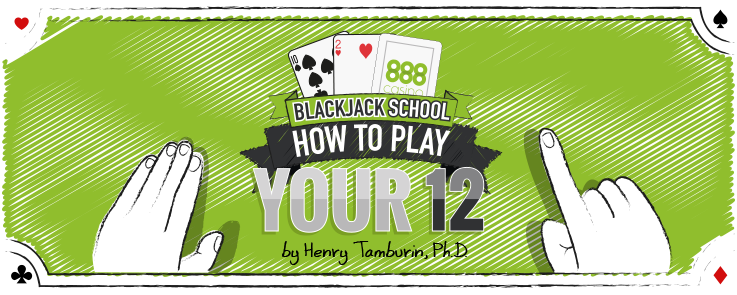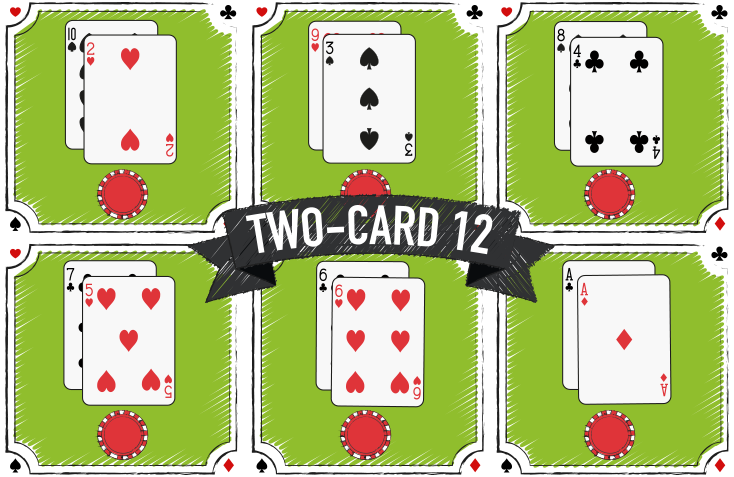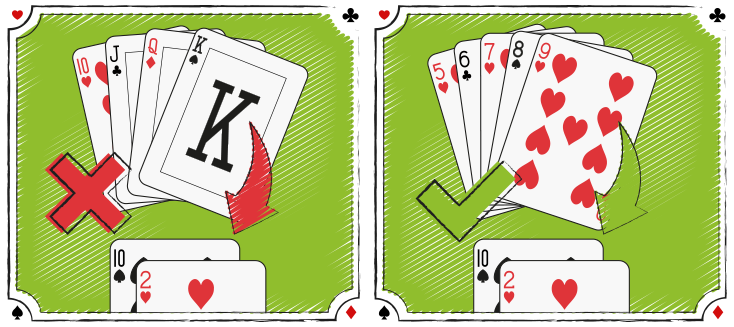How to play a 12 vs. a Dealer's 2 Upcard?

By Anonymous
|
|
One of the most common mistakes made by blackjack players occurs when they are dealt an initial hand of 12 dealer’s upcard is a 2. The reasons most players blunder on this hand is because they are afraid to draw any 10 and bust. In this article, I’ll show you how to play blackjack with your 12 perfectly every time.

Note: In this article, I won’t discuss blackjack playing strategy for a pair of 6s or pair of Aces.
When you hit your 12, only four cards can bust you: any 10, Jack, Queen, or King. On the other hand, there are five cards that will get you to made hand of 17 through 21 (any 5, 6, 7, 8, or 9)

In other words, more cards will get you to a made hands than bust your hand.
Furthermore, when the dealer has a 2 upcard showing, she or he aren't as “weak” as most players think because they bust frequency is rather low (35%) compared to other possible dealer upcards. (A bust frequency of 35% means they will make a hand 12 13 times out of 20.). Consequently, the percentages are slightly better hitting a hard 12 against a dealer’s 2 than standing.
If you stand, you’ll win 35.2% of the hands and lose 64.8%, on average (excludes ties). If you hit, you’ll win 37.4% of the hands and lose 62.6%, on average (excludes ties).

Notice that using either strategy, you will be a net loser:

29.6% for standing (64.8% – 35.2%) and 25.2% for hitting (62.6% – 37.4%).
Let’s assume you wagered $10 per hand. This means:


For a complete basic playing strategy table and color-coded charts for any set of playing rules, consult Chapter 3 in the Ultimate Blackjack Strategy Guide.
DIFFERENT WAYS TO HAVE 12
An initially dealt two-card 12 can be made-up of the following cards:
Note: In this article, I won’t discuss blackjack playing strategy for a pair of 6s or pair of Aces.
PLAYING OPTIONS
When you are dealt a 12, you can either stand or hit. No other playing options (double, split, or surrender) need to be considered.WHY PLAYERS BLUNDER
Instead of hitting 12 when the dealer shows a 2, most players will stand. Their reason, as mentioned above, is because they are afraid to hit their 12, draw any 10, and bust when the dealer is showing a “weak” 2 upcard, and may have a 10 “in the hole” and also bust. However, here’s the facts.When you hit your 12, only four cards can bust you: any 10, Jack, Queen, or King. On the other hand, there are five cards that will get you to made hand of 17 through 21 (any 5, 6, 7, 8, or 9)

In other words, more cards will get you to a made hands than bust your hand.
Furthermore, when the dealer has a 2 upcard showing, she or he aren't as “weak” as most players think because they bust frequency is rather low (35%) compared to other possible dealer upcards. (A bust frequency of 35% means they will make a hand 12 13 times out of 20.). Consequently, the percentages are slightly better hitting a hard 12 against a dealer’s 2 than standing.
MATH OF HITTING 12 AGAINST DEALER’S 2
Let’s suppose you are playing a six-deck game with the dealer standing on soft 17 and you are dealt a two-card 12 and the dealer’s upcard is a 2. The percentage of the hands that you stand to win or lose is:If you stand, you’ll win 35.2% of the hands and lose 64.8%, on average (excludes ties). If you hit, you’ll win 37.4% of the hands and lose 62.6%, on average (excludes ties).

Notice that using either strategy, you will be a net loser:

29.6% for standing (64.8% – 35.2%) and 25.2% for hitting (62.6% – 37.4%).
Let’s assume you wagered $10 per hand. This means:

- After 100 hands, in which you stand on 12 each time, you’d lose about $29, on average.

- After 100 hands in which you hit your 12 each time you’d lose about $25, on average.
- Lose $29 per $100 bet by standing?
- Lose $25 per $100 by hitting?
MULTI-CARD 12
Sometimes your 12 will be composed of three (or more) cards, for example 5-3-4 or 2-3-A-6. No problem: Regardless of the number of cards that comprises your 12, just following the above basic strategy and always hit when the dealer shows a 2 upcard.For a complete basic playing strategy table and color-coded charts for any set of playing rules, consult Chapter 3 in the Ultimate Blackjack Strategy Guide.


